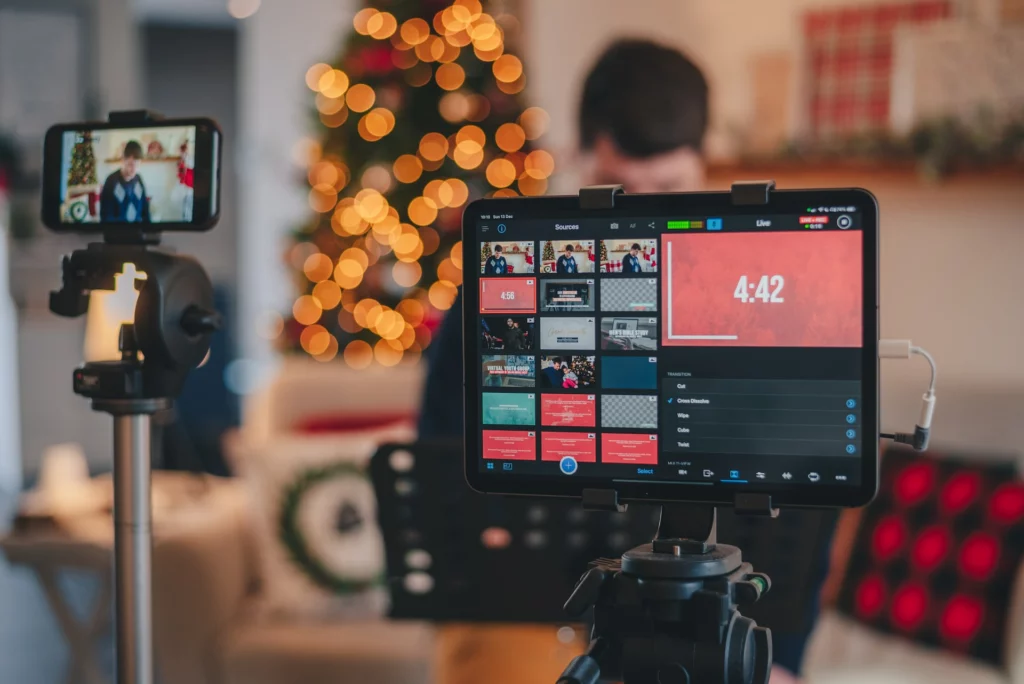To ensure speakers at your virtual event can deliver their best performances, implement a cohesive strategy for speaker preparation. This article delivers tips and strategies for effectively preparing your speakers, from establishing clear communication channels throughout the event to conducting rehearsals and tech checks.
By following these best practices, you can give your speakers what they need to prepare their tech, and their presentations, avoid technical issues, and exceed expectations. Whether you are organizing a conference, a webinar, or a virtual networking event, this article will help you create a support structure for your speakers and ensure that your virtual event is a success.
Preparation Before the Event
Preparing your speakers for a virtual event can be challenging, but ensuring they deliver their best performance is essential. Here are some best practices to consider before the event:

Communication with speakers
Regular communication with your speakers helps you understand their needs and address any concerns they may have. Best practices for speaker comms are:
- Speakers should have a clear point of contact that they can reach out to with any questions or concerns. Make sure to provide them with contact information for the appropriate person, such as an event coordinator or project manager.
- Schedule regular check-ins with speaker to discuss their presentation if necessary and address any concerns they may have. These check-ins will help you stay abreast of their progress and eliminate rework.
- Speakers need to clearly understand the format of their part of the presentation and the dos and don’ts of presenting (how much personal promotion is allowed, if there are brands or strategies to shout out, etc.)
- Have a backup method of communication for your speaker in case their technology fails during or just before the event so you can be aware of their circumstances.
- Make sure your speakers know when they’re going to present, how they’re going to present, and when they’re expected to be live at the event.
Establishing Expectations for Speakers
By providing speakers with the goals for the event and detailed guidelines for their presentations, they’ll be best equipped to deliver engaging content for your audience. Here are some best practices to consider before the event:

Clearly outline the format of the presentations
They need to know:
- The length of time they have to present
- If there will be a Q&A during the presentation (helpful if they are
pre-recording, then they might want to wear the same clothes and pre-record at the same time of day in their space) - If they will be presenting slides, will they need to put them in a brand-approved template?
- If they bring their own slides, will there be a safe area for content
behind their speaker video - Are the slides supposed to be 4:3 or 16:9?
- Can they play videos right from their slides with the audio or will they need to provide those videos as separate files beforehand?
- Will they be expected elsewhere before or after their presentation
- If there is a specific tone to use or theme to follow when presenting
Communicate the presentation’s objective
They need to know:
- The audience
- The goals of the event
- If there are key points or sponsors to highlight during the presentation
- If there are topics to avoid mentioning during the presentation
- To anticipate questions from the audience if there is a Q&A
Providing necessary information and resources
To ensure that your event’s speakers have what they need to prepare their presentations, it’s important to provide them with the necessary information and resources. Here are some essential resources to consider:

- A detailed speaker brief that outlines the presentation’s objective, target audience, and main points. This helps speakers create presentations that are tailored to the audience’s needs and align with the event’s overall objectives.
- Slide templates that maintain a consistent look and feel across presentations, making them visually appealing and easy to follow.
- Branding guidelines that communicate your organization’s branding elements, such as logos, fonts, and colors, ensure that all presentations align with your organization’s overall brand identity.
- Access to relevant research and data that supports their presentations and makes for more persuasive and engaging content.
Conducting rehearsals and tech checks
To ensure that presentations run smoothly and potential technical issues are addressed beforehand, it’s essential to conduct rehearsals and tech checks with each speaker. Follow these best practices for conducting rehearsals and tech checks:
- Schedule rehearsals with speakers in advance to provide sufficient time for preparation
- Conduct tech checks to ensure speakers can connect to the platform, share their screens, and use any multimedia elements
- Provide speakers with a list of technical requirements, such as internet speed and software requirements. If budget allows, consider providing speakers with rental AV equipment to uplevel their performance.
During the Event
It’s essential to ensure that everything runs smoothly, especially during the event itself. Here are some best practices to keep in mind during the event:

Keeping speakers informed
Speakers should be kept informed about any changes or updates to the event schedule or technology, ensuring they can adjust their presentations accordingly, minimizing any potential disruptions to the event. Here are some tips on how to keep speakers informed.
- Provide a clear and detailed schedule well in advance, including session timings, breaks, and other essential details
- Keep in touch with speakers regularly before and during the event to share updates or changes and provide a point of contact for questions or concerns
- Inform speakers promptly of any changes or updates to the event technology to allow for adjustments or updates to their presentations
Handling technical issues and interruptions
It’s important to have a plan in place for handling such issues. Here are some tips for handling technical issues and interruptions:
- Plan ahead: Anticipate potential technical issues that might arise during the event and develop a plan for how to handle them. Communicate this plan with your team and speakers to ensure everyone is prepared.
- Have backup equipment: Extra microphones or webcams, in case of technical issues. This will help to ensure that the event runs smoothly.
- Ensure stable internet connection: Ensure their internet speed is adequate to avoid any technical difficulties. A stable internet connection is crucial for virtual events.
- Conduct tech rehearsals: Test all the technology and equipment beforehand to ensure that everything is working properly. This will minimize the risk of technical issues during the event.
- Ensure smooth transitions: Have a moderator, host, or on screen graphics or videos to transition to the next speaker to minimize any disruptions and keep the event on track.
Post-Event Support
After the virtual event is over, it’s important to continue to provide support to the speakers to ensure their satisfaction and build lasting relationships. Here are some ways to do so:

Following up with speakers
Send a personalized email or message to each speaker to thank them for their participation and get their feedback on their experience. Obtaining feedback from speakers is essential to continually improve the quality of your virtual events.
By understanding their perspective, you can identify areas for improvement and implement changes to enhance the overall experience for both speakers and attendees. It also demonstrates that you value their opinion and are committed to making better events in the future.
Providing feedback and evaluation
It helps speakers identify their strengths and areas for improvement, allowing them to enhance their skills and knowledge for future virtual events. By sharing specific and constructive comments, you show your commitment to supporting your speakers’ growth and development.
During the evaluation, highlight the speaker’s strengths and provide suggestions for areas where they can improve. Sharing positive feedback from attendees reinforces the speaker’s strengths and encourages them to continue developing their skills.
Continuing the relationship with speakers
Building a strong relationship with speakers can lead to future collaborations and partnerships, as well as increased loyalty and advocacy for your organization.

To maintain this relationship, it is essential to stay in touch with the speakers and keep them informed of upcoming events and opportunities. You can also feature them in your organization’s content, such as blog posts, social media posts, or newsletters, which can increase their exposure and promote their expertise.
Conclusion
Supporting virtual event speakers is crucial for the success of any virtual event. From preparation to post-event support, providing adequate support to speakers can make a significant difference in the overall quality of the event.
By following the tips outlined in this article, you can ensure that your speakers feel valued, prepared, and confident during their presentations. This, in turn, will help to create a more engaging and informative virtual event for attendees.
So, let’s take the initiative to support our virtual event speakers by planning and executing our events with their needs in mind. Let’s celebrate their contributions, build lasting relationships, and inspire them to continue to share their knowledge and expertise with our audience. Together, we can make every virtual event a success!
Frequently Asked Questions
How do I ensure that my speakers are prepared and feel confident before the event?
Conduct a tech rehearsal with your speakers to ensure that their equipment is working properly and that they know how to use it. Provide them with clear instructions and guidelines, and give them ample time to prepare their presentation. Offer support and guidance throughout the preparation process, and make sure they have all the information they need to feel confident.
How can I handle interruptions or delays during a speaker’s presentation?
Designate a moderator or host to take over in case of any interruptions or delays. Have a plan in place for smooth transitions between speakers, and keep communication open with your team and speakers. Stay calm and professional, and be prepared to address any technical issues that may arise.
How can I encourage engagement and interaction between my speakers and the audience?
Use interactive tools such as live polling, Q&A sessions, and breakout rooms to encourage engagement and interaction. Encourage speakers to ask questions and solicit feedback from the audience. Create opportunities for attendees to network and connect with speakers, such as virtual meet-and-greets or post-event social media groups.
What are some effective incentives and benefits I could offer speakers?
Exposure and visibility through your organization’s channels, opportunities for future collaborations, and personalized feedback and evaluation of their presentation. Consider offering monetary compensation or gift cards as a token of appreciation. Providing a positive and supportive environment for speakers can also be a great incentive.






